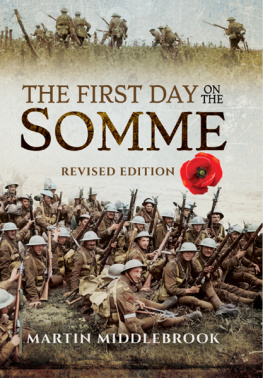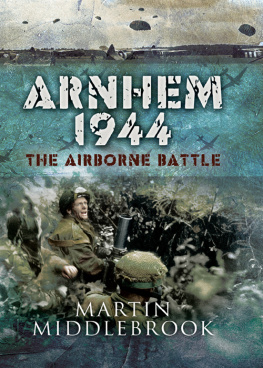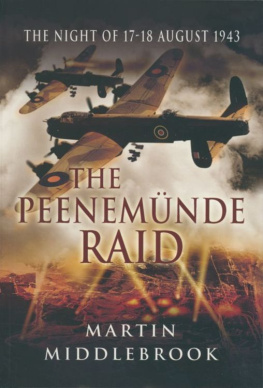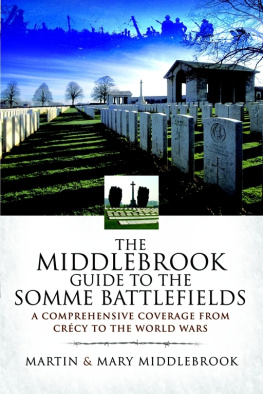First published in Great Britain in 1978 by Allen Lane
Published in 2007 in this format by
Pen & Sword Military
An imprint of
Pen & Sword Books Ltd
47 Church Street
Barnsley
South Yorkshire
S70 2AS
Copyright Martin Middlebrook, 1978, 2007
ISBN 978 1 84415 498 2
The right of Martin Middlebrook to be identified as Author of this
work has been asserted by him in accordance with the Copyright,
Designs and Patents Act 1988.
A CIP catalogue record for this book is
available from the British Library
All rights reserved. No part of this book may be reproduced or transmitted
in any form or by any means, electronic or mechanical including
photocopying, recording or by any information storage and
retrieval system, without permission from the Publisher in writing.
Printed and bound in England
By CPI UK
Pen & Sword Books Ltd incorporates the Imprints of Pen & Sword
Aviation, Pen & Sword Maritime, Pen & Sword Military, Wharncliffe
Local history, Pen & Sword Select, Pen & Sword Military Classics and
Leo Cooper.
For a complete list of Pen & Sword titles please contact
PEN & SWORD BOOKS LIMITED
47 Church Street, Barnsley, South Yorkshire, S70 2AS, England
E-mail: enquiries@pen-and-sword.co.uk
Website: www.pen-and-sword.co.uk
Several years ago I wrote a book describing in detail the opening day of the Battle of the Somme on 1 July 1916. On this day, divisions of the British and French armies made a carefully prepared attack on the German positions astride the River Somme. This book will describe in similar manner another one-day set-piece attack, but this time by the Germans against the British positions. The day was 21 March 1918 and the field of battle was also on the Somme, as the soldier put it, but farther east than the area of the 1916 fighting. Like the first day of the Battle of the Somme, 21 March 1918 was one of the great turning points of the First World War and, in the number of men involved, was probably the greatest battle of that war.
Every German soldier of 191418 had a Military Service Book in which were recorded details of the battles in which he had fought and of the quieter periods of trench warfare in which he had served. Those who survived the battle of 21 March 1918 had this simple title stamped in their books: Grosse Schlacht in Frankreich The Great Battle in France.
*
Many sound books have described what British historians later called The March Offensive or The March Retreat. All of these earlier works treat the first and subsequent days as one battle, and there is no reason why they should not, although it was the nature and the results of the first days fighting which set the seal on what was to follow. Most of these books deal with events in a conventional military-history manner by describing them from the top of the military hierarchy downwards and, although they usually pay tribute to the front-line soldiers en masse, they never really tell the reader what Private Brown or Musketier Schmidt experienced or thought while in the battle. Other books which do give personal accounts of the battle provide understandably narrow views of it or, if intended to be comprehensive, fall into the trap of taking too much note of British regimental histories published after the war. As will be shown later, these often presented a distorted and over-heroic version of events.
I make no apology for devoting a complete book to just the first day of this battle, and I will be concentrating on the experiences of the individuals involved and on the nature of the fighting at small-unit level, although as much of what the senior commanders and the politicians were doing as will enable the reader to set the battlefield scenes in context will also be included.
I must add a few words on sources. Before any use can be made of personal contributions, it is always essential to establish a reliable framework of the orders of battle of units, of the plans and orders of leaders, and of the main events in the battle itself. In preparing this framework I have relied heavily upon the following sources: Military Operations France and Belgium 1918, The German March Offensive and its Preliminaries, compiled by Brigadier-General J. E. Edmonds and published in 1935 (this is referred to henceforth as the British Official History);* Der Weltkrieg 191418, Volume 14, published by the Oberkommando der Wehrmacht in 1944 (to be referred to as the German Official History); and the War Diaries of the British Army units involved which became available at the Public Record Office in 1965. Unfortunately there are drawbacks to the use of all these sources. Because of the results of the fighting on the first day, the War Diaries of the front-line British battalions are in parlous state, as the British Official Historian acknowledges, and this work suffers accordingly, there being huge gaps in the descriptions of events at battalion level although it is perfectly sound when describing the plans and preparations of both sides. The German Official History turned out to be only a very general work and contains little detail below corps level. I have studied only the most original and reliable of the non-official published works; new books based purely on library research do not appeal to me. The Fifth Army by General Gough, Godspeeds Ludendorff and The Private Papers of Douglas Haig are all useful, as is the more recently published biography, Goughie, by Anthony Farrar-Hockley; and my thoughts have been stimulated by some of the essays in John Terraines The Western Front 191418 and his book Impacts of War 1914 and 1918.
One unusual prime source of material has been the registers of the Commonwealth War Graves Commission cemeteries and Memorials to the Missing in France. These list all fatal casualties, and a study and analysis of those registers covering the area of this battlefield provided an unexpected research bonus.
My appeals, in 1975, for men involved in the battle brought an almost overwhelming response, and I now have the results of interviews or correspondence with 518 Britons and 129 Germans who were involved in the battle on 21 March 1918, the highest positions held being battalion commanders on the British side and company commanders on the German side. The sceptical reader will, with some justification, query the value of old mens memories. But it was a day that most of the survivors would never forget and the material available from them has been dealt with in a very careful manner. All offerings were judged against the background of the known activities of the mans unit, and the general rule was that if any one part of an individual account was found seriously incorrect no other part of it was used. Another sieve was the sixth sense that one develops on reading so many accounts or after many hours interviewing; this soon tells when a man is going astray. A serious drawback in these personal accounts is the forgivable tendency for a man to present his own actions in the best possible light, while the man who has every reason to conceal his actions, such as the soldier who threw away his rifle and hid in a shell hole until the fighting was over or the one who may have been involved in a battlefield atrocity, rarely volunteers to help at all. I have tried to make allowances for such distortions.












